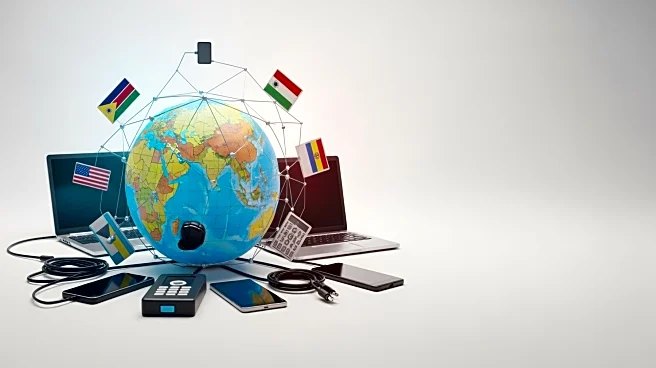What's Happening?
A new report by the Basel Action Network (BAN) has revealed that several large US brokers are allegedly involved in exporting electronic waste (e-waste) to developing countries, a trade estimated to be
worth billions of dollars. The report, titled 'Brokers of Shame: The New Tsunami of American e-Waste Exports to Asia,' highlights the ongoing export of US electronics to countries that have banned such imports and lack the infrastructure to manage them safely. The United States remains the only industrialized nation that has not ratified the United Nations Basel Convention, which restricts hazardous waste trade between developed and developing countries. BAN's findings, based on trade data, field observations, and GPS tracking, suggest that approximately 2,000 shipping containers filled with US e-waste leave American ports monthly, destined for countries like Malaysia, Indonesia, Thailand, the Philippines, and the United Arab Emirates.
Why It's Important?
The export of e-waste to developing countries poses significant environmental and health risks, as these nations often lack the capacity to safely process such waste. E-waste contains toxic metals like lead, cadmium, and mercury, which can leach into the environment, causing pollution and health hazards. The report underscores the growing global e-waste problem, with production expected to rise from 62 million metric tons in 2022 to 82 million by 2030. Despite the increase, only a small percentage of e-waste is formally recycled, with much of it ending up in informal scrapyards in developing countries. This situation highlights the urgent need for stricter regulations and enforcement to prevent hazardous waste from being misdeclared and exported under false pretenses.
What's Next?
The findings of the BAN report may prompt calls for the United States to ratify the Basel Convention and strengthen its regulations on e-waste exports. Environmental groups and policymakers might push for more robust tracking and enforcement mechanisms to ensure compliance with international waste management standards. Additionally, there could be increased pressure on the identified US businesses to halt their involvement in the e-waste trade and seek more sustainable recycling solutions domestically. The report may also lead to heightened awareness and advocacy efforts to address the broader issue of electronic waste management globally.
Beyond the Headlines
The report sheds light on the ethical implications of e-waste exports, as developing countries bear the brunt of environmental degradation and health risks associated with improper waste management. It raises questions about the responsibility of developed nations to manage their waste sustainably and the need for global cooperation to address the e-waste crisis. The situation also highlights the potential for innovation in recycling technologies and the development of circular economies to reduce waste and promote sustainable practices.












